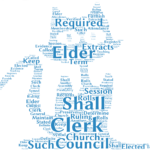With the resignation of our current stated clerk, Ruling Elder Joan Jeffers, as of January 31, 2016 the Presbytery through its Personnel committee is looking for folks willing to stand for the office of Stated Clerk. Use the website Contact Us page to indicate your interest in the position, scheduled to start February 1, 2016.
UPDATE: Council accepts Clerk’s withdrawal of her resignation. Read more…
There is a draft position description for the contract position which anticipates 20 hours a week on average with a compensation of up to $20,000 a year plus expenses and mileage.
Our Book of Order (G-3.0104) states that a clerk shall:
record the transactions of the [presbytery], keep its rolls of membership and attendance, maintain any required registers, preserve its records, and furnish extracts from them when required by another council of the church…The clerk of a presbytery…shall be called stated clerk, shall be elected by the [presbytery] for a definite term as it may determine, and must be a ruling elder or teaching elder.
Here is a draft position description for stated clerk that the Personnel committee is using as a working document.
Here is a 8×11 PDF poster advertising the position for posting in churches.
The Rev. Catherine G. Borchert, former Stated Clerk of the Western Reserve, at a meeting of presbytery Stated Clerks held in Pittsburgh expanded on this description. Here are excerpts from the version on the website of Northumberland Presbytery:
In the finest sense, the Presbytery Stated Clerk serves as a protector of the priesthood of all believers, as a prime connector in the connectional church, as the guardian of the history of a people who believe in the God of history. The Stated Clerk is the servant of all and is responsible to all.
Implicit in these duties is a responsibility to be careful and caring; to further the work of Christ’s body, not cause it to come to a standstill; to protect the few from the many and also the many from the few, to do all that is possible in a quiet and consistent fashion. If the clerk succeeds, the clerk’s position should be virtually unnoticed.
The clerk must be steeped in Presbyterianism, understand almost intuitively the way in which the Holy Spirit can use our process to further the Kingdom. The clerk must understand the letter of the law, and yet abide by the spirit of the law in order that the law itself not become a god.
The clerk operates in a position of being at once a team member of a presbytery, synod or General Assembly staff and being the judge of the actions of that staff.
In the way that the dual role of servanthood and counsel is understood and acted upon lies the gift of a clerk to the governing body of which he or she is a part.


